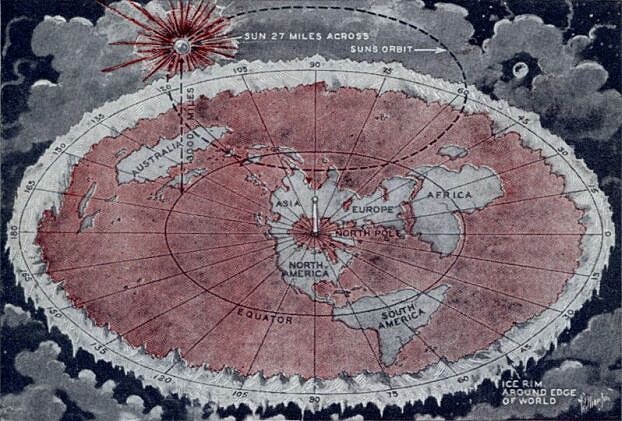FlatEarths

Wilbur Glenn Voliva's flat earth map. Modern Mechanics and Invention, October, 1931
"It can well afford to wait until we Flat Earthers catch on to its subtle significance."
In his essay The Relativity of Wrong, [The Skeptical Inquirer, Fall 1989, Vol. 14, No. 1, Pp. 35-44], Isaac Asimov presented a canny reframe of the common right/wrong dichotomy. He provocatively declared Flat Earthers' notions as not so much wrong as incomplete. For the Sumarians, who he supposed had originally concluded that the earth was flat, for most intents and purposes, their world was, in practice, flat. Earth's very slight curvature, about 0.000126 per mile, a quantity very close to 0 per mile, turns out to have been almost right and not, as moderns popularly believe, utterly and totally wrong. The truly tiny difference between zero and 0.000126 (eight inches) per mile compounds, though, as horizons expand beyond the local neighborhood. What remained obscure to the ancients became inescapably obvious to their later progeny. We might even say that most of today's more complete understandings stand atop yesterday's less complete ones. The often infinitesimal nature of significance continues to fool us as it did our forebears. Today, we have tough guys crowding together in Sturgis, apparently because, to the vestigial Sumarian part of their perception, a sub-microscopic virus shouldn't qualify as anything to get all that worried about. Right wing-nut commentators wonder what all the fuss could possibly be if we're 'only' projected to lose six percent of our population to the pandemic, and many of those folks, in their calloused imaginations, were ready to shuffle off anyway. ©2020 by David A. Schmaltz - all rights reserved
If this plague year should have taught us anything, it should have convinced most of us that the infinitesimals matter more than we thought. This humbling acknowledgement could prove to further humble us into a finer form of civility, though, predictably, it seems to have been fracturing us first. We humans tend to come together by the curious means of falling apart until a majority starts understanding from unlikely perspectives. Evolution, Asimov claimed, proved an elusively acceptable understanding because it moves so damned slowly and mysteriously, employing eons while we inhabit relatively immeasurably tiny slices of time. The mountain where The Villa Vatta Schmaltz High stands is a particularly unconvincing form of sand, continually flowing on a scale I cannot perceive. For me, it's an immutable solid. From a geologist's perspective, it never stopped moving. The small hill I inhabit might just as well, in geologic terms, be a wave breaking so slowly that I can hold my delusion without consequence.
Scientists get paid to pay attention to the tiny crap we cannot find space to fit into our schedules. They serve as the early warning systems which we all too often accuse of crying wolf, for we cannot perceive what they seem to see so clearly. Modern times have spawned a whole new class of skeptics, incompletely-informed doubters who discount whatever they cannot perceive. Combined with political power, a whole generation can successfully, at least in any short-run, deny whatever will inevitably become inescapably obvious. In the longer run, our skepticism tends to make fools of most of us, transforming us into either Chicken Littles or Nostradamuses. For many of the graver scientific predictions, we'd really prefer not to know what's coming and will dedicate ourselves to maintaining whatever we've grown accustomed to, damned the consequent torpedos. We cannot always afford to know (yet) what might later become so obvious. We seem to joyfully become fools for our incomplete understandings before those same shortcomings make fools out of us and our beliefs.
Accepting any expert's perspective seems to require an act of faith. Since you and I cannot replicate their findings, we're called to trust. How much easier it seems to simply distrust the inconvenience instead. Their existential dread becomes the butt of our jokes and we quite unashamedly bull ahead as if we had nothing to dread. We can protest against nature, refuse to wear our masks in public, paint even the most dedicated investigator as a world class bullshitter, but at our own peril. The risks seem tiny, and might even prove to be minuscule, but as scientists since Sumarian times have struggled to confide, the tiny matters more than their apparent size discloses. A one degree difference when navigating can land you on a different continent when persisted over long periods of time. A certain care seems essential to avoid embarrassing catastrophes, and whether one characterizes that care as prudent or prissy, a certain humility usually comes after the resulting fall. I hope this Damned Pandemic pounds a few additional ounces of humility into humanity. I know it's trying just as hard as it can, with us struggling to understand how anything so seemingly insignificant could convince us of anything. Virus', though, can be rather … insistent, patiently persistent while we come to understand and appreciate more completely. It can well afford to wait until we Flat Earthers catch on to its subtle significance.


